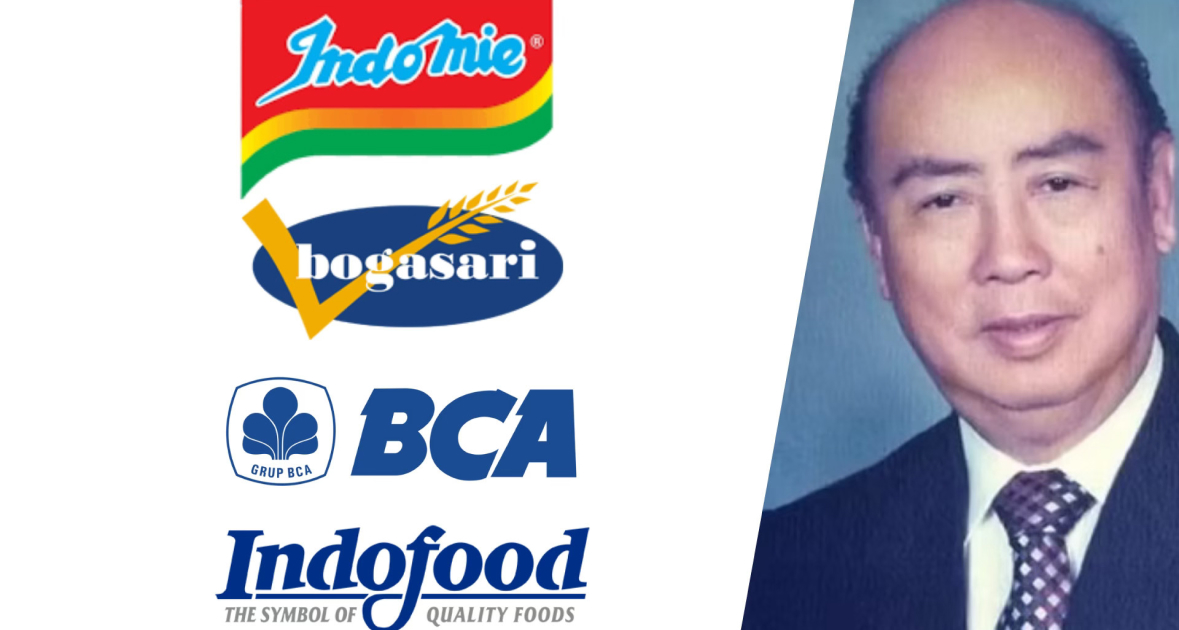


If you’ve ever tossed Indomie into your cart or lined up at a BCA bank branch in Indonesia, you’re running into Sudono Salim’s legacy.
It’s easy to forget that behind all those brands was a man who started out with a single shop, selling cloves by the sack to survive. He didn’t inherit a fortune or have a map to follow. He just kept spotting the needs nobody else saw and building what everyone eventually relied on.
By the time he was done, Salim had turned a small trading business into Indonesia’s biggest business empire. He shaped how millions of people ate, worked, and saved.
Many things you touch in Indonesia today still have his fingerprints.
🫶🏻 Community lifeline
In the 1930s, Sudono Salim (born Liem Sioe Liong) arrived in Kudus, Central Java. Back then, the city was known for its clove-scented air and its busy, lively markets.
As a young migrant from Fujian, China, Salim started by selling cloves to shopkeepers who struggled to get supplies from the big trading families.
He didn’t have much capital, but he built up trust, sometimes extending credit to those turned away elsewhere. By focusing on the overlooked, he built a network that survived every swing and setback.
🥐 Betting on flour over flash
During Indonesia’s early years after independence, most investors chased fortunes in oil, tin, and rubber. Salim saw that people needed something more basic: affordable flour.
In 1971, he founded Bogasari Flour Mills, taking major personal risks and bringing in international expertise.
Since roads and ports were unreliable, Salim built his own trucks, storage, and logistics to keep flour moving when roads failed.
Bogasari did more than sell flour. It helped put bread and noodles on tables for millions.
✅ Delivering when it mattered most
The 1960s brought a new era of turbulence. Politics shook business, and the military reshaped the economy.
Salim adapted by supplying the army with basics like flour, soap, and building materials.
It was during this period that he forged a working relationship with Suharto—then a rising general who would soon become Indonesia’s longtime president.
The connection helped Salim secure permits and steady growth through political uncertainty. Even so, he never left his fate in the hands of power alone.
Salim kept his own supply networks strong, making sure no shift in Jakarta could bring his business to a halt.
🇮🇩 Turning Indomie into a national staple
By the 1970s, more Indonesians were moving to cities and spending less time in the kitchen.
As families rushed to city life, Salim spotted the hunger for a quick meal.
Through Indofood, he launched Indomie in 1972 with Chicken Broth flavor, priced for daily budgets: students, workers, young families to fill the gap.
Indofood ran free tastings and made sure every warung and convenience shop was stocked. Indomie quickly went from a curiosity to a daily ritual. It found its way into city kitchens, school canteens, and street stalls all across the country.
Over the decades, Indomie grew far beyond Indonesia. Indofood became the world’s largest instant noodle maker, and Indomie became a symbol of comfort and affordability for millions.
🏦 Building the financial backbone
As his businesses expanded, Salim saw that existing banks couldn’t meet his needs or match his scale.
In 1957, with partners like Mochtar Riady, he founded Bank Central Asia (BCA).
At first, BCA supported group companies, but over time it grew into one of Indonesia’s top banks.
📈 Expanding into every corner of life
Salim didn’t stop at food or finance. His businesses grew into palm oil, cement, real estate, and shipping.
In 1988, the Salim Group launched Indomaret’s first minimarket in North Jakarta. With a focus on convenience and daily accessibility, Indomaret quickly became the country’s largest minimarket network.
By the 1990s, Salim’s companies encompassed 500 businesses and employed over 200,000 people.
😱 Surviving crisis
The 1997 Asian Financial Crisis nearly erased everything.
The rupiah fell fast, debts soared, and anti-Chinese violence forced the family into hiding.
As the government led emergency bailouts, Salim surrendered prized businesses like BCA and Indocement.
He never lost sight of what mattered. Even in crisis, Salim kept flour trucks rolling and noodle shelves stocked.
And though he lost his crown jewels, this steady focus helped the group rebuild under his son, Anthony’s leadership.
💪🏼 Legacy in every corner
Today, even as some businesses have changed hands, Salim’s original blueprint remains everywhere.
Indofood leads the world in instant noodles. BCA stands among Indonesia’s top banks. Indomaret is a neighborhood fixture across the country. The palm oil, flour, and cement businesses Salim grew still feed families and fuel the economy.
Salim’s success was about seeing what others ignored, building for the long term, and sticking to essentials, so that his impact became woven into daily Indonesian life.

The newsletter that keeps you up-to-date on the top stories on tech and business in Southeast Asia. It's fun, quick and free.